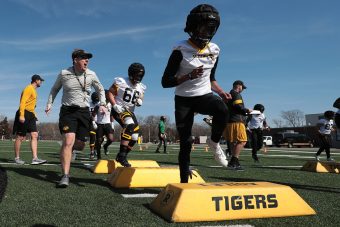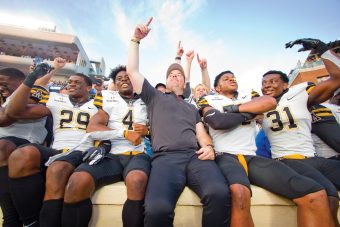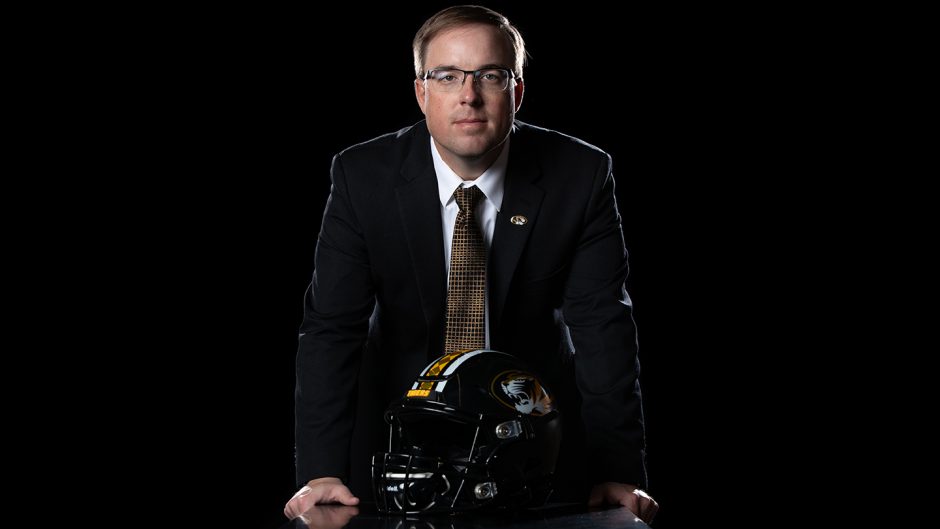September 22, 2020
Story by Mark Godich, BJ ’79
Note: Any photos and video that do not depict current safety practices were taken prior to COVID-19 public health orders and guidelines.
John Klekamp is Missouri through and through. He was born and raised in St. Louis County, graduated from Lincoln University, and has coached high school football since 1997, the past 10 years as the head coach at rural Montgomery County High. “I just love the game,” he says. “I can be found talking to one of my coaches for hours about football and drawing something on a whiteboard.”
What Klekamp has never had is a passion for University of Missouri football. “I’ve always wanted to root for the home team,” he says. But then he is quick to add, “I’ve been doing this for more than 20 years, and I’ve never been to a Mizzou game.” A rabid Notre Dame fan, he says he had no reason to make the 54-mile drive to Columbia on a fall Saturday.
Eliah Drinkwitz is changing that. The 37-year-old Arkansan with one year of Division I head coaching experience — the man who signed the eyebrow-raising six-year $24 million contract — continues to show why he was the right man for the job at this time as Missouri football tries to regain traction in the grind that is the SEC. One by one, Drinkwitz is winning the skeptics over. Take, for example, Klekamp, who was intrigued when he heard Drinkwitz at his introductory news conference in December, got fired up upon seeing the viral video of Drink’s reaction to a Texas recruit’s announcement that he had chosen Mizzou over Alabama and the home-state Longhorns, and was blown away by the 20-minute phone call he had with new Tiger running backs coach Curtis Luper in April.
Keep in mind that little ol’ Montgomery County is a school with an enrollment of about 400. The Wildcats haven’t produced a Division I player since the mid-1990s, and Klekamp was quick to remind Luper that he doesn’t have any such prospects coming through the program. Luper didn’t much care. The two men talked a little about football and a lot of family, and before they hung up, Luper told Klekamp to call if he ever needed anything.
Say hello to John Klekamp, new Mizzou football fan.
“I talk to a lot of college coaches,” Klekamp says. “This was a different kind of conversation. I was not offering him anything, and he was offering me something. To have the main school in the state reach out and try to build that relationship with the little guy was awesome.”
The message was much the same in the blitz Drinkwitz and Co. employed across the state during that week in April, the staff burning up the phone lines to reach out to coaches from each of the more than 400 schools that play football in Missouri and in bordering towns.
Upon being relayed details of the Luper-Klekamp chat, Drinkwitz says with a hint of enthusiasm: “That’s what it’s all about right there. Our job is to get all of us pushing in the same direction. We’ve echoed that the spirit of Mizzou is St. Louis, Kansas City and rural Missouri, and we’ve got to unite all of them. If we can do that, then we’ve got a chance.”
So he is exhaustively leading the campaign, ever present on social media and especially Twitter. It’s about being visible, selling his vision of the state’s flagship football program and energizing the fan base. Sure, football is the focus, but it’s about more than that. He has posted videos in which he has thanked those serving on the front lines of the pandemic, made himself heard on social issues, saluted new graduates, pitched a reading program to youngsters and even chastised Columbians for failing to return their shopping carts to their proper place. (Attention, Walmart shoppers: Coach Drink would like a word about personal responsibility!) Pretty much every video ends with an M-I-Z. The gif of a Tiger growling “Welcome to the New Zou” that he tweets to his 45,000 followers when a recruiting commitment is imminent — and there already have been a slew for the class of 2021 — sets Missouri fan message boards abuzz, speculation running rampant about who the program’s newest pledge might be.
“Any way to communicate,” Drinkwitz says. “I can be stubborn and say I don’t want to use social media. The reality of it is, I’ve got to get our message across to our team, to our fans and to our recruits. Whatever that avenue is, that’s what we’re going to do.”
Ah, recruiting. It is, of course, the lifeblood of every program, and — stop us if you’ve heard this before — Mizzou is in the unique position of being able to attract prospects from two metropolitan areas as the only Division I school in the state. The Tigers, however, simply haven’t been all that good at sealing the borders. At least not consistently. Time and again, marquee programs (Ohio State, Oklahoma and Notre Dame, to name three) have raided the state to steal star recruits. It has been a particularly big problem in St. Louis.
“I was talking with a prominent St. Louis high school coach who told me the kids here are buying what Coach Drink is selling,” says Josh Helmholdt, the Midwest recruiting analyst for Rivals.com. “And that’s an important part of recruiting. They have to believe in your product. They have to believe in your process.”
So far, so good. By early August, six of the staggering 18 commitments Missouri had secured were from the St. Louis area. The early recruiting success has not gone unnoticed around the city, even as the staff has been hamstrung by its inability to show off one of the program’s biggest assets — the $100 million south end zone facility at Faurot Field. Drinkwitz, however, seems unfazed. “Adjust and adapt,” he says matter-of-factly about the challenges of operating in a pandemic. Virtual recruiting it is. The guy was made for it.
De Smet coach Robert Steeples, BS BA ’12, a cornerback at Mizzou from 2009 to ’11 who later played in the NFL, says Drinkwitz comes off as a guy brimming with confidence. “The vibe I got from him is a guy who’s confident in his knowledge of the game and what he has to do to implement it,” Steeples says. “That belief could get a lot of guys to buy in. His passion seems to be infectious, along with his charisma.”
Klekamp was sold the instant he saw the 102-second video of Drink’s reaction to the announcement from Ennis Rakestraw, a cornerback from Duncanville, Texas. “That’s the kind of guy I can root for,” Klekamp says. “It’s one recruit, but you can tell he was really competitive about it and wanted to celebrate it. He just seems real genuine. Those are the kinds of things that speak to us at the high school level, especially at the small schools, with the way we coach and the passion we have for our kids.”
"Coach, I'm coming home" - @EnnisRakestraw #MIZ x #NewZou20 🐯🏈 pic.twitter.com/LPfNvWtmOh
— Mizzou Football (@MizzouFootball) February 5, 2020
As a St. Louis native who starred at De Smet and returned to coach at his alma mater, Steeples is well-versed in the world of recruiting. St. Louis has become a hotbed, and most agree the talent in the city and around the state runs deep enough for Mizzou to build the foundation for a highly successful program. Lest we forget, 10 of the 11 offensive starters from the 2007 team, which got to No. 1 in the country and was one victory from playing for the national championship, were from the state. In fact, all five linemen hailed from small-town Missouri, proof there’s a place in the program for players from rural schools and why Drinkwitz will leave no stone unturned to find them.
The biggest issue in recruiting the state, Steeples says, is the program hasn’t always placed a high emphasis on the value of Missouri prospects. “It wasn’t that the talent wasn’t there,” he says. “The school didn’t necessarily see value in those players. You can feel that when you’re recruited. You can tell when you’re a priority and when you may come off as an afterthought. A lot of times Mizzou was late to the party.”
Adds Helmholdt: “If you’re not valuing the guys in your backyard more than the guys in someone else’s backyard, kids notice that. I think Drinkwitz has done a good job of showing appreciation for the home-state talent.”
So what exactly is the message?

“It’s a combination of the vision we have for the future of Mizzou football and the vision we have for their lives,” Drinkwitz says. “We talk about chasing two dreams: a life with football and a life after football. The life with football, we believe we can win the SEC East. That’s the mission. That’s why we’re here.
“We believe education changes lives. It has to do with making sure the players understand that and how those two things coexist and why it’s important for us that they happen simultaneously while they’re at Mizzou.”
That’s all well and good, but the bottom line is that Drinkwitz will be judged by the product he puts on the field — in other words, the wins and losses, the ability to contend in the SEC East, the quality of the bowl games. He’s no stranger to success, having made a meteoric rise up the coaching ranks from the days when he cut his teeth as the coach of the seventh grade team in Alma, Arkansas, back in 2005. He has worked under some of the best offensive minds in the game, most notably Gus Malzahn, now the coach at Auburn. No surprise, Drink’s hands will be all over the offense.
Ask him to describe what kind of system Missouri fans can expect, and his cadence quickens, perhaps as a nod to the way his offense will play: fast. “We call it pro-tempo offense, pro-style,” he says. “We’re based out of the no-huddle, but we’ll play with multiple personnel groups. We want to be able to play as fast as we want and as slow as we need to.”
Don’t confuse fast with finesse. The offense is predicated on a downhill running game, and the skill set of the quarterback will largely dictate how Drink chooses to attack. Never was that more evident than in his last two offenses. At Appalachian State last season, he oversaw the 16th-ranked rushing attack in the country, leaning on the legs of Darrynton Evans, who ran for 1,480 yards. Even with a passing game that ranked 93rd, the Mountaineers averaged 39.8 points per game, ninth best in the land. The previous year, when he was the offensive coordinator at NC State, Drinkwitz rode the arm of Ryan Finley, a future NFL draft pick. The Wolfpack ranked eighth in the country in passing offense, and although they were only 100th in rushing, the balance between the run and the pass was almost 50-50.
“We’re going to have a dominant downhill run game, and we’re going to throw vertical shots,” Drinkwitz says. “Our offense comes down to three things: rhythm, attack, execute. Everybody has plays. It’s a matter of whether your offense is comfortable doing it and if it’s in rhythm. It’s a matter of whether the defense feels like it’s threatened on every play that you may score. And then can your team execute? Can they play well under pressure?”

Drinkwitz will call the plays, and in a rare move, he’ll also coach the quarterbacks. It’s what he did at App State, and it’s hard to argue with the results: a 13–1 record, including wins at North Carolina and South Carolina, and a No. 19 ranking in the final AP poll. Drink has an eye for quarterback talent, a quality he traces to his days as a high school coach. He learned early on that quarterbacks come in all shapes and sizes and that no two are the same. So you adapt the offense to the kid’s strengths.
There’s more to it than simply coaching a position, however. Drinkwitz believes his extra involvement makes him accountable in staff meetings and film sessions. He’s going to make mistakes just like his assistants do, and he’s not afraid to own up to them. “Low ego, high output,” as he puts it. Plus, he believes his candidness reminds his staff that everyone is human and they’re all in it together. Then there’s this: “The saying is: My ass, my hands. If my ass is on the line, my hands are going to be involved in it.”
As the running backs coach at App State last season, Garrett Riley had a front-row seat for the Drink Show. The Mountaineers were coming off a couple of successful seasons and returned a wealth of experience. But if it sounds as if Drinkwitz walked into the perfect situation, don’t be fooled. He installed his own offense, put himself in charge of the QBs and navigated the choppy waters of being a first-time head coach. Never mind how he handled the double duty as a position coach. Riley was especially impressed with Drink’s organizational skills and football knowledge.
“He’s very intelligent, a guy who’s really organized,” says Riley, who’s now the offensive coordinator at SMU and is the younger brother of Oklahoma Coach Lincoln Riley. “He brought a lot to the table in terms of the entire organization and how it operated. I thought he was well beyond his years, and not having been a head coach, I thought he really excelled at that. And then just very knowledgeable with his system, his offense and the way he wants players to be developed.”
Philosophically, Riley says he doesn’t expect much to change from what he witnessed with the Mountaineers. “Balance, change of tempo,” he says. “Formationally, he’s very tough for defenses. It’s what he does with formations and motions. It’s going to be hard to prepare for. He’s going to look for big plays like everybody does, and that’s something he has a pretty good feel for. And make no mistake about it: He’s going to pride himself on making them tough and being a physical team.”
Drinkwitz, Riley notes, takes great pride not only in developing quarterbacks but also in identifying what they can handle. The offense evolves from that. And therein lies arguably his biggest challenge heading into his first season at Mizzou. Understandably, one of Drinkwitz’s biggest frustrations has been the lack of opportunities to work more closely with his quarterbacks. The Tigers got in only three spring practices before things were shut down, and as the calendar turned to April, the staff was relegated to virtual coaching. Even that was limited. Then came word in late July that the SEC would play a 10-game, conference-only schedule, starting on Sept. 26. Sure, that gives Drink more practice time, but lost is the opportunity to conduct quarterback auditions against the likes of Central Arkansas. (Oh, and those two added SEC opponents? Alabama and LSU.) The starter figures to come from one of three candidates: junior Shawn Robinson, a transfer from TCU who sat out last season; redshirt freshman Connor Bazelak, who played in three games in 2019 before tearing the ACL in his right knee in the season finale; and redshirt junior Taylor Powell, who has 76 career pass attempts.
“It’s going to have to happen very quickly, and they’re going to have to maximize their reps,” Drinkwitz says. “That’s probably the biggest thing we’re going to have lost in this. Whoever comes in the most prepared and takes advantage of their opportunity is going to win the job.”
John Klekamp will be watching. If the situation allows, he might even be there.
About the author: Mark Godich, a 1979 graduate of the Missouri School of Journalism, is a senior editor at The Athletic and a former senior editor at Sports Illustrated.
To read more articles like this, become a Mizzou Alumni Association member and receive MIZZOU magazine in your mailbox. Click here to join.




